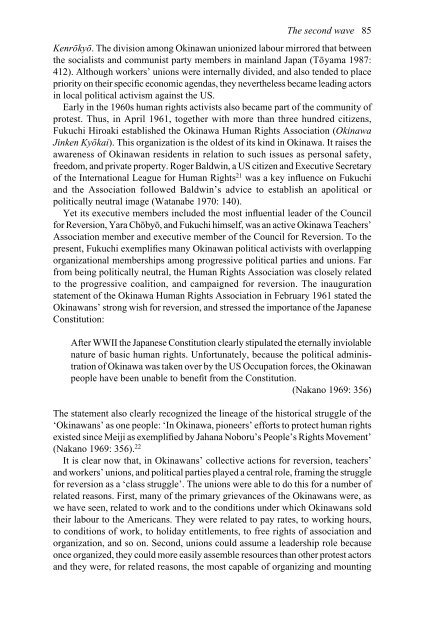Myth, Protest and Struggle in Okinawa
Myth, Protest and Struggle in Okinawa
Myth, Protest and Struggle in Okinawa
Create successful ePaper yourself
Turn your PDF publications into a flip-book with our unique Google optimized e-Paper software.
The second wave 85<br />
Kenrōkyō. The division among Ok<strong>in</strong>awan unionized labour mirrored that between<br />
the socialists <strong>and</strong> communist party members <strong>in</strong> ma<strong>in</strong>l<strong>and</strong> Japan (Tōyama 1987:<br />
412). Although workers’ unions were <strong>in</strong>ternally divided, <strong>and</strong> also tended to place<br />
priority on their specific economic agendas, they nevertheless became lead<strong>in</strong>g actors<br />
<strong>in</strong> local political activism aga<strong>in</strong>st the US.<br />
Early <strong>in</strong> the 1960s human rights activists also became part of the community of<br />
protest. Thus, <strong>in</strong> April 1961, together with more than three hundred citizens,<br />
Fukuchi Hiroaki established the Ok<strong>in</strong>awa Human Rights Association (Ok<strong>in</strong>awa<br />
J<strong>in</strong>ken Kyōkai). This organization is the oldest of its k<strong>in</strong>d <strong>in</strong> Ok<strong>in</strong>awa. It raises the<br />
awareness of Ok<strong>in</strong>awan residents <strong>in</strong> relation to such issues as personal safety,<br />
freedom, <strong>and</strong> private property. Roger Baldw<strong>in</strong>, a US citizen <strong>and</strong> Executive Secretary<br />
of the International League for Human Rights 21 was a key <strong>in</strong>fluence on Fukuchi<br />
<strong>and</strong> the Association followed Baldw<strong>in</strong>’s advice to establish an apolitical or<br />
politically neutral image (Watanabe 1970: 140).<br />
Yet its executive members <strong>in</strong>cluded the most <strong>in</strong>fluential leader of the Council<br />
for Reversion, Yara Chōbyō, <strong>and</strong> Fukuchi himself, was an active Ok<strong>in</strong>awa Teachers’<br />
Association member <strong>and</strong> executive member of the Council for Reversion. To the<br />
present, Fukuchi exemplifies many Ok<strong>in</strong>awan political activists with overlapp<strong>in</strong>g<br />
organizational memberships among progressive political parties <strong>and</strong> unions. Far<br />
from be<strong>in</strong>g politically neutral, the Human Rights Association was closely related<br />
to the progressive coalition, <strong>and</strong> campaigned for reversion. The <strong>in</strong>auguration<br />
statement of the Ok<strong>in</strong>awa Human Rights Association <strong>in</strong> February 1961 stated the<br />
Ok<strong>in</strong>awans’ strong wish for reversion, <strong>and</strong> stressed the importance of the Japanese<br />
Constitution:<br />
After WWII the Japanese Constitution clearly stipulated the eternally <strong>in</strong>violable<br />
nature of basic human rights. Unfortunately, because the political adm<strong>in</strong>istration<br />
of Ok<strong>in</strong>awa was taken over by the US Occupation forces, the Ok<strong>in</strong>awan<br />
people have been unable to benefit from the Constitution.<br />
(Nakano 1969: 356)<br />
The statement also clearly recognized the l<strong>in</strong>eage of the historical struggle of the<br />
‘Ok<strong>in</strong>awans’ as one people: ‘In Ok<strong>in</strong>awa, pioneers’ efforts to protect human rights<br />
existed s<strong>in</strong>ce Meiji as exemplified by Jahana Noboru’s People’s Rights Movement’<br />
(Nakano 1969: 356). 22<br />
It is clear now that, <strong>in</strong> Ok<strong>in</strong>awans’ collective actions for reversion, teachers’<br />
<strong>and</strong> workers’ unions, <strong>and</strong> political parties played a central role, fram<strong>in</strong>g the struggle<br />
for reversion as a ‘class struggle’. The unions were able to do this for a number of<br />
related reasons. First, many of the primary grievances of the Ok<strong>in</strong>awans were, as<br />
we have seen, related to work <strong>and</strong> to the conditions under which Ok<strong>in</strong>awans sold<br />
their labour to the Americans. They were related to pay rates, to work<strong>in</strong>g hours,<br />
to conditions of work, to holiday entitlements, to free rights of association <strong>and</strong><br />
organization, <strong>and</strong> so on. Second, unions could assume a leadership role because<br />
once organized, they could more easily assemble resources than other protest actors<br />
<strong>and</strong> they were, for related reasons, the most capable of organiz<strong>in</strong>g <strong>and</strong> mount<strong>in</strong>g
















